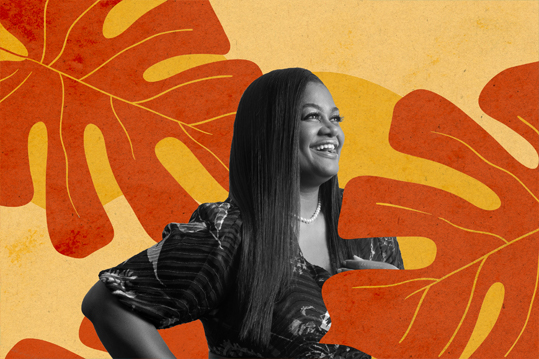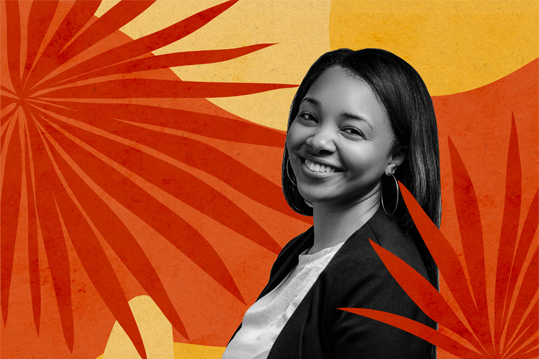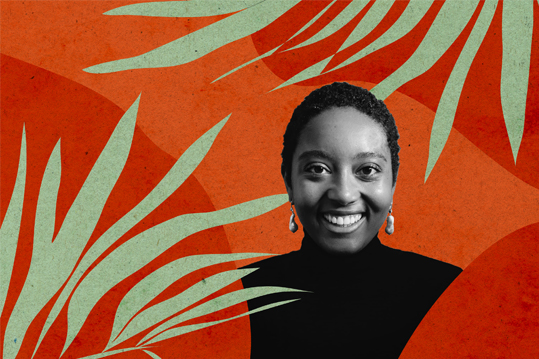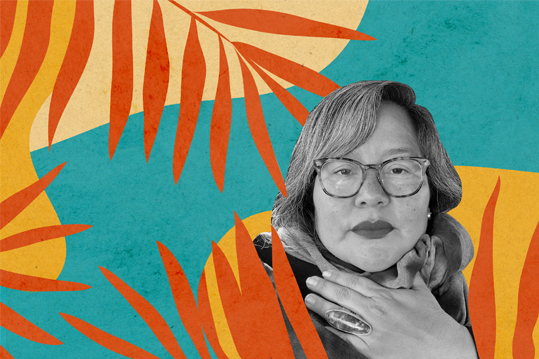ProductPayPalPeopleDIE&BPerformanceCorporate Announcements
Dig into Richmond, Virginia’s historical homeownership trends and you’ll find a likely surprising statistic: In the 1920s, Black people owned nearly 40% of homes in the city, putting Richmond near the top of the rankings for Black home ownership in the U.S.

This original print by artist Reyna Noriega was commissioned
for the 2021 PayPal Maggie Lena Walker Award.
This is one of the many legacies of Maggie Lena Walker, the first Black woman – and first woman – to charter and lead a U.S. bank, which also employed mostly women. Walker started Richmond’s St. Luke’s Penny Savings Bank in 1903 and focused on serving underserved Black borrowers at a time when racial discrimination was rampant. The daughter of a former slave, she recognized how money could economically empower Black people and prioritized using banking to extend economic opportunities to Richmond’s Black community. By 1907, bank deposits were $79,000 and exceeded $300,000 by 1918 – the equivalent of more than $5 million today. Yet despite her influence, Walker’s name and work have remained relatively unknown.
To celebrate Walker’s contributions and those of similar women who have created opportunities for economic advancement in underserved communities, PayPal established the Maggie Lena Walker Award – including one category for Achievement and another for Emerging Leaders. The award specifically recognizes the demonstrated commitment of women from underrepresented groups, and the winners receive a cash award and mentorship from the PayPal community.
Today, PayPal is excited to announce the first class of recipients, whose work reflects the late banking executive and civil right activist's mission and legacy.
Achievement Award Winner: Kathryn Finney - CEO, Genius Guild; general partner, The Greenhouse Fund

Why Kathryn: Kathryn has spent much of her career investing in and empowering Black women-owned startups. In 2013 she launched digitalundivided, a social enterprise that empowers Black and Latinx entrepreneurs. Kathryn built on that work in 2015 with #ProjectDiane, an initiative that aimed to use data to unearth diversity problems in tech. Most recently, she launched Genius Guild, a business creation platform that uses a venture studio model – lab, fund and community – to build and invest in scalable companies led by Black founders, and The Greenhouse Fund, a $10M pre-seed venture fund that invests in market-based innovations that end racism.
Why her work is important: While the number of U.S. businesses owned by Black women has more than doubled since 2007, Black women continue to be largely shut out of fundraising opportunities. Black and Latinx women founders received just 0.64% of venture capital investment from 2018 to 2019, according to a 2020 Project Diane study.
How she’s making an impact: Kathryn’s work has addressed these disparities at their core by connecting Black women entrepreneurs with the funding and resources needed to grow. Under her leadership, digitalundivided helped dozens of Black and Latinx women raise more than $50 million over the past decade, and #ProjectDiane research helped increase venture funding of Black women-owned businesses by 1000%. Her Greenhouse Fund, which has raised $10 million from a number of investors, including the Melinda Gates-backed Pivotal Ventures, has offered between $75,000 to $200,000 in pre-seed investments to Black business founders and funds.
Emerging Leader Award Winner: Sheena Allen - founder and CEO, CapWay

Why Sheena: Just as Maggie Lena Walker saw banks as essential institutions for enabling Black opportunity, Sheena has dedicated herself to giving Black Americans, and other underserved communities, fuller access to this resource. In 2020, she launched CapWay, a mobile banking and financial technology company for those who have been underserved, overlooked, and misunderstood by the traditional financial system, making her one of just three Black women in the U.S. to start her own digital bank. Sheena’s mission is to use CapWay to create opportunities and access to fair financial services, equity and financial education.
Why her work matters: Citing high fees, balance requirements, and lack of access, roughly 6% of U.S. adults (including 14% of Black adults) didn’t have bank accounts in 2019, according to the Federal Reserve. Instead, many of these Americans turn to alternative financial services such as check-cashing services, payday loans and pawn shops, which often subject customers to punishing fees and interest.
How she’s making an impact: Sheena has raised millions of dollars for CapWay since its founding in 2020. With a steady increase in user growth, CapWay is looking to expand its partnerships with a wide variety of organizations aligned with its mission of financial inclusion and literacy and has entered into partnerships with organizations such as Atlanta-based Legacy or Lose and Mississippi’s Hind County School district.
Emerging Leader Award Winner: Chloe B. McKenzie - founder, BlackFem

Why Chloe: Raised in an affluent family, Chloe understands how she’s benefitted from generational wealth. Inspired to afford that opportunity to more Black women, in 2015 Chloe launched BlackFem, a wealth justice organization with the commitment to close the racial and gender wealth gap by healing financial trauma and maximizing the wealth-building capabilities for Black women and girls. WealthRise®, the organization’s proprietary, research-backed intervention model, creates ecosystems of support with cities and education systems to provide financial education and build financial health.
Why her work matters: The wealth gap between Black and white women remains staggeringly wide: In 2020, Brookings found that the median wealth of single white women was $6,470 - more than sixty times greater than that of a single Black woman, who had a median wealth of $101. According to Chloe's research, financial trauma plays a large role in sustaining this disparity.
How she’s making an impact: Since 2015, Chloe has expanded BlackFem to 22 U.S. cities and helped more than 100,000 Black women and girls build greater financial education and navigate the financial system. The organization’s fee-free bank account initiative, called Bank on Us, has generated $47,000 in wealth for account holders since its inception.
Emerging Leader Award Winner: Vanessa Roanhorse - CEO, Roanhorse Consulting; co-founder, Native Women Lead

Why Vanessa: Vanessa Roanhorse is a citizen of the Navajo Nation and her work has focused on creating economic opportunities for Indigenous communities in New Mexico and other areas of the Southwest. In 2016, Vanessa founded Roanhorse Consulting, an Indigenous women-led think tank that partners with leaders, communities and governments to develop inclusive economic development initiatives for Indigenous communities and others who have been overlooked. She is also one of eight co-founders of Native Women Lead, which offers Indigenous women in business culturally-relevant resources and capital to grow their operations.
Why her work matters: At 25.4%, poverty among Indigenous communities in the U.S. is twice the national average and the highest among all minority groups, according to U.S. Census data. By working with local organizations, Roanhorse is creating economic empowerment for Indigenous communities that desperately need it.
How she’s making an impact: Native Women Lead’s annual business summit has connected more than 1,000 Indigenous and Native American women through gatherings providing training for everything from creating a business plan to branding and pitching investors. Funding has made an impact, too. The Native Women Lead’s Matriarch Response Loan Fund lent $150,000 (interest-free) to 35 Native women-owned businesses in just two weeks to help them navigate the COVID-19 pandemic. Vanessa’s Roanhorse Consulting has also worked on a City Navigators project for the city of Albuquerque, including an effort to address a Bus Rapid Transit project along the city’s Historic Route 66 to keep small businesses open, and has designed a character-based lending program with Nusenda Credit Union that has provided more than $1 million in small loans to underserved communities, specifically Native American and immigrant.